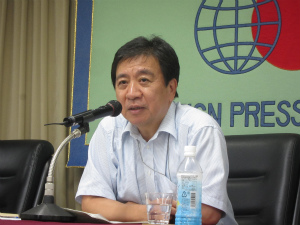Date : July 17, 2013
Report: Prospect of Abe Administration after Upper House Election (July 17, 2013)
post date : 2013.08.21

FPCJ invited Mr. Hiroshi Hoshi, Columnist and Senior Political Writer, Asahi Shimbun, to talk about the "Prospect of the Abe Administration after the House of Councillors' Election." As many as 65 people, including 36 foreign journalists, took part in the briefing, which indicated that they were highly interested in the post-election Abe Administration.
First Mr. Hoshi referred to two focal points in the Upper House Election:
(1) Whether the Liberal Democratic Party led by Mr. Abe will gain a majority in both the House of Representatives and the House of Councillors, getting rid of the so-called divided Diet, and
(2) Whether the LDP and Nippon Ishin no Kai (Japan Restoration Party) can win a two-thirds majority in the Upper House as well, which would give them the more than two-thirds majority necessary for Constitutional amendments.
On the first point, he said, "According to media opinion polls, it is very likely that the LDP will win about 70 seats and New Komeito about 10; thus the ruling parties will have a majority in the Upper House. It seems difficult, however, that the LDP alone can have a majority, and the LDP-New Komeito coalition will be maintained." On the second point, he predicted, "It is not likely that the LDP and the JRP will have more than two-thirds of the seats in the Upper House. Therefore, there will be no move toward Constitutional amendments for the time being."
Referring to the post-election Abe Administration, Mr. Hoshi pointed out that it will have a difficult launch as it has three numerical targets:
(1) Attainment of a 2% price increase rate over the coming two years,
(2) Gradual raising of the consumption tax to 10%, and
(3) Achievement of primary balance surplus against GDP from the level of FY2010.
He also said that because foreign countries and the markets are expecting Japan's structural reform and because many Diet members are elected with the support of industries, it will be very important how boldly Mr. Abe will review and abolish vested interests.
Then Mr. Hoshi presented two possible scenarios --optimistic and pessimistic -- on the future Japanese politics as follows:
(1) optimistic scenario: The LDP and New Komeito will have a majority in both Houses, which will enable them to pass their bills and budgets easily, promote economic growth and deregulation, raise stock prices, and propel fiscal reconstruction by tax increases.
(2) pessimistic scenario: Reviews of vested interests and structural reconstruction will not proceed and stock prices will not go up. As it is predicted that the consumption tax rate will be raised even if stock prices go down, the Cabinet approval rating will go down and Prime Minister Abe's leadership will weaken, resulting in intraparty conflict in the LDP.
At the end, Mr. Hoshi said, "Which scenario will come into being depends on whether the Japanese people can bear the period of political hardship, as well as on Prime Minister Abe's capability, so the several coming months will be a period in which the whole of Japan can be tested."
At the Q & A session, questions were on the influence of the financial crisis in Europe, Japan's nuclear policy after the Upper House Election, and the possibility of a visit to Yasukuni Shrine by Prime Minister Abe on August 15.



